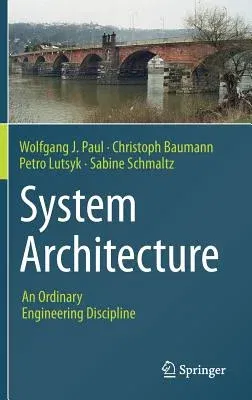Wolfgang J Paul
(Author)System Architecture: An Ordinary Engineering Discipline (2016)Hardcover - 2016, 12 October 2016

Qty
1
Turbo
Ships in 2 - 3 days
In Stock
Free Delivery
Cash on Delivery
15 Days
Free Returns
Secure Checkout

Print Length
512 pages
Language
English
Publisher
Springer
Date Published
12 Oct 2016
ISBN-10
3319430645
ISBN-13
9783319430645
Description
Product Details
Book Edition:
2016
Book Format:
Hardcover
Country of Origin:
NL
Date Published:
12 October 2016
Dimensions:
23.39 x
15.6 x
2.87 cm
ISBN-10:
3319430645
ISBN-13:
9783319430645
Language:
English
Location:
Cham
Pages:
512
Publisher:
Weight:
907.18 gm